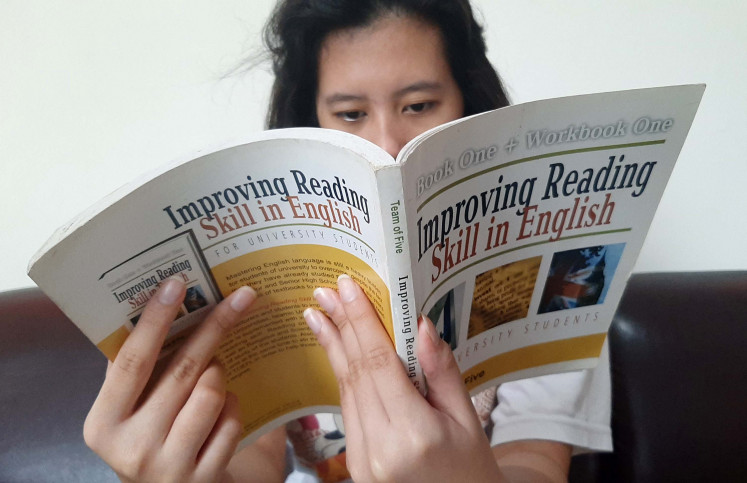Popular Reads
Top Results
Can't find what you're looking for?
View all search resultsPopular Reads
Top Results
Can't find what you're looking for?
View all search resultsApps help people build linguistic prowess
Language apps have made it easier to learn and practice skills anytime, anywhere, which is suitable also within the context of the coronavirus outbreak, where people have to observe physical distancing and avoid large gatherings and also have more free time at home.
Change text size
Gift Premium Articles
to Anyone
J
onathan Nicholas Yap, a 17-year old who has just graduated from senior high school in Jakarta, is not remaining idle during his COVID-19-related three months of self-isolation.
Besides attending online classes, studying and doing his homework, he has been studying Mandarin using language-learning app Cakap since March 2020. Cakap is an Indonesian word that has a double meaning as a verb and adjective, namely to talk and to be skillful.
“China’s influence in the world is becoming greater day after day; speaking Mandarin will be a very useful skill to master in the days to come. And now, as I have a break before entering college, I choose to grow my personal skills by deepening my foreign language skills,” he informed The Jakarta Post in a WhatsApp message.
Meanwhile, Jonathan Kriss, a 29-year-old account director of a local company living in West Jakarta, already speaks basic English. At a time when he cannot travel anywhere and is confined to his home for all weeks of lockdown, he has decided to take an advanced English course, using the same language-learning app.
“I challenge myself to enrich my English language usage to attain advanced, near-native skills, which will be useful to handle international clients,” he said.
Language apps have made it easier to learn and practice skills anytime, anywhere, which is suitable also within the context of the coronavirus outbreak, where people have to observe physical distancing and avoid large gatherings and also have more free time at home, since they can no longer enjoy their leisure activities outside the house.
It is no surprise, that since the COVID-19 pandemic was announced in Indonesia, with President Joko “Jokowi” Widodo calling on the public to work, study and pray at home to flatten transmission curve, the app Cakap has seen the number of its users increase more than five.
Compared to the same period of 2019, Cakap’s traffic has increased by 3,200 percent.
“The pandemic has made studying from home a mainstream trend, which has become a very normal part of life for people across all walks of life, from school and university students to corporate employees, supported by the high usage of the internet, which has reached more than 60 percent of the entire Indonesian population,” Cakap chief executive officer Tommy Yunus said.
Speaking of advancing one’s English proficiency, ELSA is an application that helps individuals speaking English as a second language to speak more fluently and confidently while reducing the accent deriving from their native languages to “pronounce English like an American”, as its website states.
According to ELSA Speak cofounder and chief executive officer Vu Van, the application has received positive feedback in multiple markets, including Vietnam, Japan, India and Latin America, with a wide range of curricula catering to students from all walks of life.
“Elsa offers immediate and detailed feedback on your speaking and pronunciation, which is difficult to get if you learn in a classroom setting, unless you take one-one-one lessons,” Van said.
Yap and Kriss said that their instructors in Cakap had boosted their motivation to practice every day to up their ante in Mandarin and English, respectively.
Read also: Where you can learn new languages online for free
Language-learning tips
Mastering several languages can greatly benefit your career while helping you earn international friends along the way. It can also be beneficial for your health: A 2019 study published in the Frontiers of Neuroscience journal showed that mastering at least two languages – being bilingual – can help delay the onset of Alzheimer’s by four to five years.
If you long to acquire enough skills in that foreign language to converse seamlessly with native speakers, follow these steps advised by Fajar Triperdana, a 29-year-old hyperpolyglot who speaks more than a dozen languages and currently lives in Bogor:
1. Soak your brain in that language
Learning languages means understanding the sounds, nuances and usage in that language. By listening to lots of speech by native speakers through podcasts, videos and films as well as reading books and articles, you get more familiar with such expressions and will be more fluent in pronouncing them. You can listen to podcasts or vlogs on your smartphone while you are commuting or washing your dishes, for instance.
Reading to learn: Ayra, a senior high school student in Jakarta, reads an English textbook. When you are learning a foreign language, reading books and materials in that language will help expand your vocabulary and refine your sense of grammar and usage. (JP/Arief Suhardiman)2. Practice, practice, practice
You can practice solo by talking to an app or talking to yourself, but practicing the language in a social setting, including talking to native speakers, would be the most beneficial and motivational for you: A study by Canadian psychologist Ellen Bialystok revealed that, by their willingness to speak to you and correct your mistakes, these native speakers can boost your motivation to further refine your skills in that language.
“When I learned Japanese, I went to lots of cultural events by the Japanese embassy; I would start talking to native speakers who appeared to be approachable and friendly,” Fajar, also a member of the Indonesian Polyglot Community, said.
3. Don’t be afraid to make mistakes
Finally, do not let your fear of embarrassing yourself get in the way of your practicing. People will understand that you are still learning.
“Start conversing based on the vocabulary and grammar you know. When you make mistakes, your native speaker counterparts will ask for clarification or correct your mistakes, and that’s how you learn to speak the foreign language even better next time,” he said.











